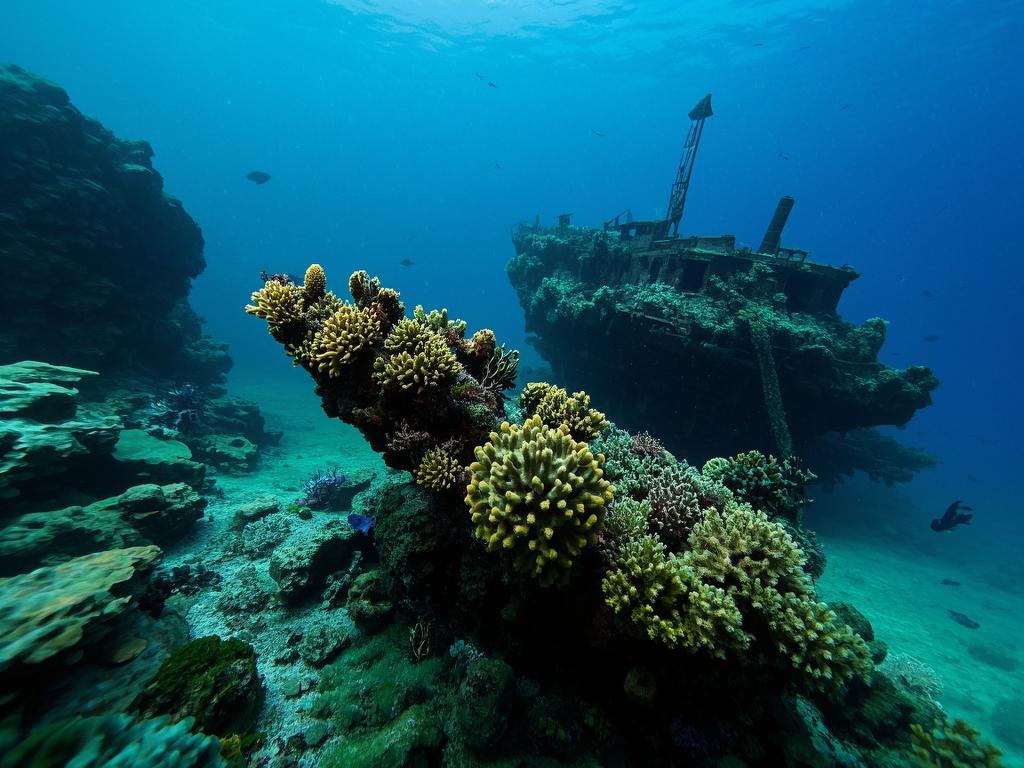
# The Deep Seas of the Mediterranean: Hidden Gems in Decline
Ahoy, fellow ocean enthusiasts! Today, we're diving deep into the Mediterranean Sea, a body of water that's not just a geographical entity but a living, breathing ecosystem with a story as rich and complex as the marine life it harbors. But here's the catch – this vibrant underwater world is facing some serious challenges, and it's time we took a closer look.
The Mediterranean Sea is often referred to as the "cradle of civilization." Its shores have witnessed the rise and fall of empires, from the ancient Greeks and Romans to the Phoenicians and beyond. This historical significance has left an indelible mark on the region, but it has also had unintended consequences for its delicate marine ecosystem.
Let's start with the numbers. Over the past few decades, the Mediterranean has experienced a significant increase in tourism. According to recent statistics, millions of tourists flock to its beaches every year, drawn by its warm waters, stunning coastlines, and rich cultural heritage. While tourism is undoubtedly a boon for the local economy, it has also put immense pressure on the marine environment.
One of the most visible impacts is the degradation of coastal habitats. As more and more tourists arrive, coastal areas are being developed at an alarming rate. Sandy beaches are being replaced by concrete resorts, and mangrove forests and seagrass beds – crucial habitats for a variety of marine species – are being destroyed. These habitats serve as nurseries for fish, protect against erosion, and play a vital role in carbon sequestration. But with their destruction, we're not just losing a piece of the Mediterranean's natural beauty; we're disrupting the entire food chain.
Take, for example, the decline of seagrass meadows. These underwater grasslands are home to countless species, from tiny shrimp to large sea turtles. They provide food and shelter for fish, help filter pollutants from the water, and even contribute to the stability of the coastline. Yet, due to coastal development, pollution, and climate change, seagrass meadows in the Mediterranean are shrinking at an alarming rate. In some areas, they've declined by as much as 50% over the past few decades. That's like losing half of a crucial ecosystem overnight!
But it's not just coastal habitats that are suffering. The open waters of the Mediterranean are also facing a range of threats. Overfishing is one of the most pressing issues. With the increasing demand for seafood, fishing fleets have become more efficient, using larger nets and more advanced technology to catch fish. As a result, many fish stocks in the Mediterranean are now severely depleted. Some species, like the bluefin tuna, have seen their populations decline by over 90% in recent years. This not only affects the livelihoods of fishermen but also has a cascading effect on the entire marine ecosystem.
Pollution is another major concern. The Mediterranean is a dumping ground for all sorts of waste, from plastic bottles and bags to industrial chemicals and sewage. Every year, millions of tons of plastic end up in its waters, choking marine life and disrupting the food chain. Plastic debris can entangle fish, birds, and marine mammals, causing injury or death. It can also be ingested by smaller organisms, which are then eaten by larger predators, leading to the accumulation of toxins in the food web.
And let's not forget about climate change. Rising sea temperatures, ocean acidification, and more frequent extreme weather events are all taking a toll on the Mediterranean's marine ecosystem. Warmer waters are causing coral bleaching, which kills the colorful coral reefs that are home to a diverse range of marine species. Ocean acidification, caused by the absorption of carbon dioxide from the atmosphere, is making it harder for shellfish and other organisms with calcium carbonate shells to build and maintain their structures.
So, what can we do to save the Mediterranean's hidden gems from further decline? Well, the first step is awareness. We need to educate ourselves and others about the importance of this unique ecosystem and the threats it faces. By spreading the word, we can inspire more people to take action.
One way to make a difference is to support sustainable tourism. When we choose eco-friendly resorts and tour operators, we're sending a message that we value the environment. We can also reduce our own impact on the marine environment by using less plastic, properly disposing of our waste, and supporting local conservation efforts.
Another important solution is to advocate for better environmental policies. Governments need to take stronger action to protect the Mediterranean's marine ecosystem. This includes implementing stricter fishing regulations, reducing pollution, and investing in renewable energy sources to mitigate the effects of climate change.
Finally, we can all play a role in conservation efforts. Whether it's participating in beach clean-ups, supporting research projects, or simply spreading the love for the ocean, every little bit helps. Together, we can make a difference and ensure that the Mediterranean's hidden gems continue to thrive for generations to come.
In conclusion, the Mediterranean Sea is a treasure trove of biodiversity and cultural heritage. But it's also in decline, facing a multitude of threats from human activities and climate change. As ocean enthusiasts, it's our responsibility to take action and protect this precious ecosystem. So, let's dive in, make a splash, and work together to save the Mediterranean's hidden gems before it's too late!

